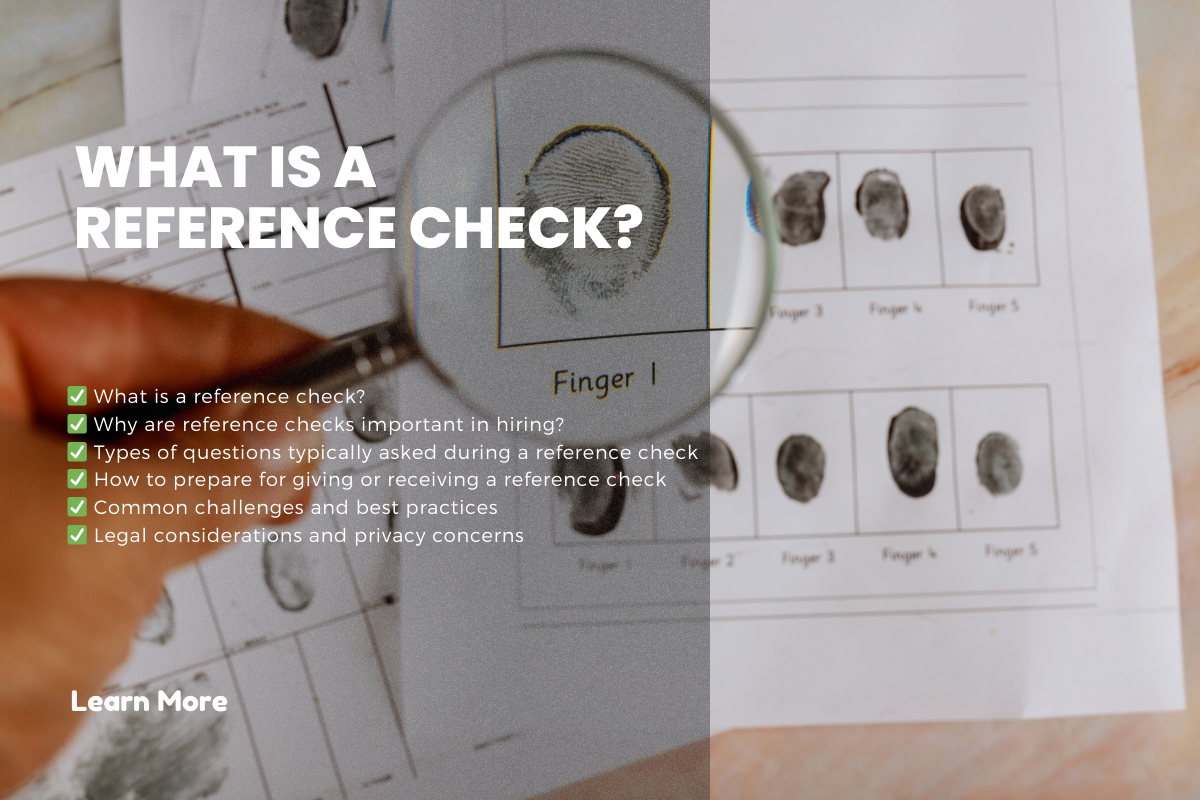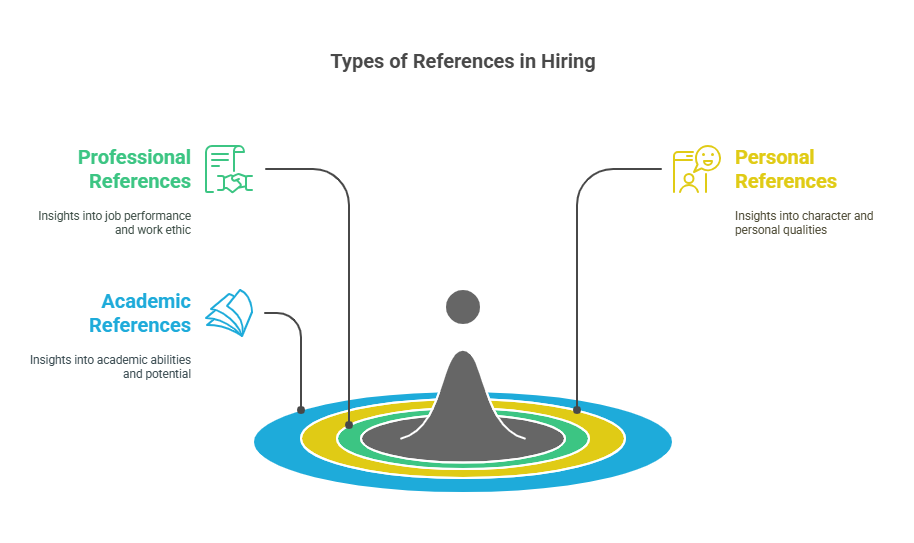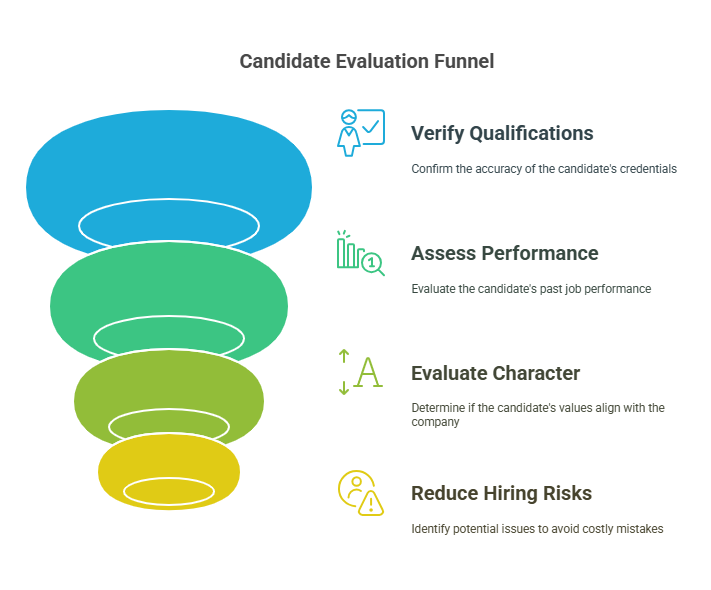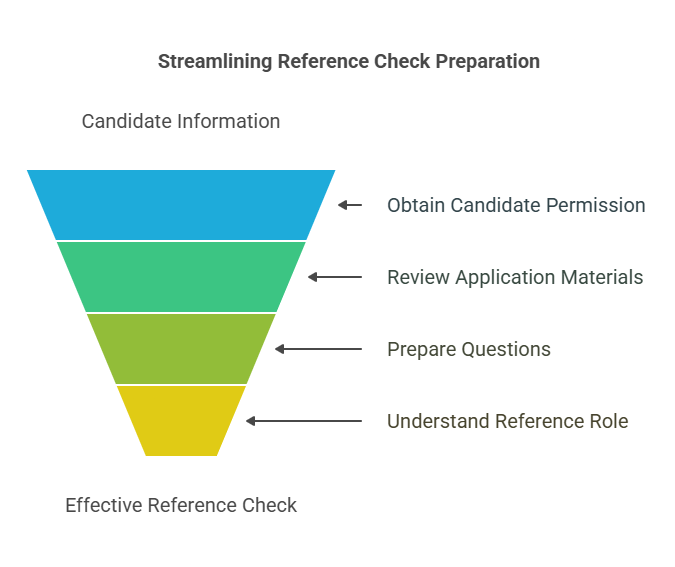Table of Contents
ToggleWhat is a Reference Check?

Definition and Purpose of a Reference Check
A reference check is a process that employers use to verify a candidate’s qualifications, skills, and character by contacting individuals who know the candidate professionally, personally, or academically. Typically conducted during the final stages of the hiring process, reference checks allow employers to confirm the information provided by a candidate and evaluate their suitability for a specific job or position.
Reference checks can take various forms, ranging from a brief phone call to a detailed questionnaire, depending on the employer’s preference and the position being filled. This verification process helps employers gain more insight into the candidate’s background, which is crucial for making informed hiring decisions.
Types of References Typically Checked

Employers may request different types of references depending on the candidate’s background and the nature of the job. Here are the most common types of references:
- Professional References: These references are individuals who have worked closely with the candidate in a professional capacity. They may include supervisors, managers, or colleagues who can provide insights into the candidate’s job performance, work ethic, and skills. Professional references are often the most valuable since they relate directly to the candidate’s work experience.
- Personal References: Personal references are typically people who know the candidate on a personal level but may not have worked with them professionally. They could include friends, acquaintances, or mentors. While personal references can speak to the candidate’s character, they are generally considered less authoritative than professional references.
- Academic References: In some cases, especially for recent graduates or candidates applying for academic positions, academic references are essential. These may include professors, academic advisors, or research supervisors who can vouch for the candidate’s abilities, academic performance, and potential for success in their chosen field.
Why Reference Checks Are Important

Reference checks are a crucial component of the hiring process for employers, providing an opportunity to validate the information provided by the candidate and ensure the candidate is a good fit for the company. Here’s why they matter:
- Verification of Qualifications: Reference checks allow employers to confirm the candidate’s qualifications and the accuracy of their resume or application. It helps ensure that the candidate possesses the required experience and skills for the position.
- Assessing Work Performance: Employers can learn about how the candidate performed in their previous roles. By hearing from former colleagues or supervisors, employers can assess the candidate’s strengths and weaknesses in a real-world setting.
- Character Evaluation: Employers want to ensure that a candidate’s character aligns with the company’s values. Reference checks help employers understand the candidate’s behavior, work ethic, and how they interact with others in the workplace.
- Reducing Hiring Risks: A thorough reference check helps employers avoid making costly hiring mistakes. By verifying details and learning about the candidate’s past performance, employers can avoid potential issues like poor job performance, unethical behavior, or poor fit with company culture.
By performing a reference check, employers are better equipped to make informed decisions and minimize hiring risks, ensuring they choose the best candidate for the job.
How to Conduct a Reference Check
Steps to Take Before Contacting References

Before you begin contacting references, it’s essential to prepare and follow certain steps to ensure that the process is thorough and efficient:
- Obtain Permission from the Candidate
The first step in conducting a reference check is to obtain explicit permission from the candidate. While it’s standard practice, ensuring that the candidate is comfortable with you contacting their references is crucial. Some candidates may have personal reasons for not wanting certain references contacted, or they may prefer to choose which references are used. Respecting their wishes will help maintain transparency and trust during the process. - Review the Candidate’s Application and Resume
Before reaching out to references, take time to review the candidate’s application, resume, and any other relevant materials. This will help you tailor your questions to the specific skills and experiences listed by the candidate. Having a clear understanding of the candidate’s background ensures that the reference check is focused on the most important details. - Prepare a List of Relevant Questions
To make the reference check process more efficient, prepare a set of questions that you’ll ask each reference. These questions should be consistent across all references and aligned with the candidate’s job requirements. Sample questions may include inquiries about the candidate’s job performance, strengths, weaknesses, and how they interact with colleagues and supervisors. - Understand the Role of the Reference
Before contacting the reference, make sure you understand the role the reference plays in the candidate’s career or personal life. This will help you ask more targeted and specific questions. For example, a former supervisor can provide insight into the candidate’s work performance, while a colleague can speak to their teamwork and interpersonal skills.
What to Ask During a Reference Check
When you contact the reference, be prepared with the following types of questions to get a comprehensive view of the candidate’s background and character:
- Job Performance:
- “Can you describe the candidate’s main responsibilities during their time at your company?”
- “How did the candidate handle challenges or stressful situations?”
- “Was the candidate able to meet deadlines and work independently?”
- Skills and Strengths:
- “What are the candidate’s key strengths or areas of expertise?”
- “What skills do you think they excel at that would be beneficial for this new role?”
- Interpersonal Skills:
- “How does the candidate interact with colleagues and managers?”
- “Can you provide an example of how the candidate worked as part of a team?”
- Work Ethic and Attitude:
- “How would you describe the candidate’s work ethic and attitude toward their job?”
- “Were there any notable areas where the candidate could improve?”
- Rehire Eligibility:
- “Would you consider re-hiring this individual if the opportunity arose?”
- “Is there any reason why you wouldn’t recommend them for another position?”
Using Reference Check Services
For employers who want to streamline the reference check process, reference check services can be extremely helpful. These services can assist in verifying employment history, obtaining references, and ensuring that the candidate’s information is accurate.
At rapid hire solutions, we offer comprehensive reference check services to help businesses ensure they’re making the right hiring decisions. Our platform allows employers to access accurate and detailed background checks, including professional reference verification. Whether you’re conducting a background check for a single candidate or multiple applicants, our services simplify the process and ensure compliance with all necessary regulations.
Another advantage of using professional services is the speed and efficiency they offer. Employers can often receive faster results and avoid potential delays or inconsistencies that can arise when doing reference checks manually.
How Employers Use Reference Checks to Assess Candidates
Once the reference check is complete, employers analyze the feedback provided to determine how well the candidate fits the role. The information gathered helps employers assess:
- Cultural Fit: Reference checks allow employers to understand if a candidate’s personality and values align with the company culture.
- Performance Validation: Employers can compare the feedback from references against what the candidate has claimed in interviews and on their resume.
- Potential Red Flags: Reference checks also help uncover any red flags, such as dishonesty about past job duties, performance issues, or interpersonal conflicts with coworkers.
The Role of Reference Check Services in This Process
While some companies may handle reference checks internally, many organizations opt for specialized services that make the process more efficient. These services often provide a structured format for collecting references, allowing employers to gather and assess the information more systematically.
At rapid hire solutions, we can guide both employers and candidates through the reference check process to ensure accuracy and help prevent hiring mistakes. By using our platform, employers can streamline the reference-checking process, saving time and ensuring that they make informed decisions about potential hires.
Legal Aspects of Reference Checks
When conducting a reference check, it’s important for employers to be aware of legal considerations to ensure compliance with employment laws and avoid potential legal pitfalls. Here are some key legal aspects to keep in mind:
1. Consent and Privacy Laws
Employers must obtain the candidate’s consent before contacting references. In most cases, this consent is implicitly granted when a candidate submits their application or resumes, but it’s a good practice to have explicit permission to avoid any privacy violations. Some states may have specific privacy laws regarding the sharing of certain information, so employers should be aware of the regulations that apply in their jurisdiction.
2. What Can and Cannot Be Asked
Employers need to be cautious about the types of questions they ask during reference checks. Certain questions are legally off-limits due to anti-discrimination laws, such as:
- Discriminatory questions: Employers cannot ask questions about a candidate’s age, race, religion, gender, marital status, or sexual orientation.
- Health-related questions: Employers are prohibited from asking about a candidate’s disability or medical history, unless it’s directly related to the job requirements.
- Personal lifestyle questions: Questions regarding a candidate’s personal life, such as family plans or political views, should not be asked.
Employers should focus on questions that are directly relevant to the candidate’s ability to perform the job and their previous work experience.
3. Negligent Hiring Liability
Employers have a legal obligation to ensure they are hiring individuals who are fit for the position, especially in positions of trust. Failing to conduct proper reference checks could expose the company to negligent hiring liability, especially if the hired candidate engages in harmful behavior that could have been prevented through a thorough reference check.
Employers should follow a consistent, standardized process for checking references and ensure that all necessary background information is gathered before making hiring decisions.
FAQs about Reference Checks
Here are some of the most frequently asked questions about reference checks:
How long does a reference check take?
The duration of a reference check depends on several factors, including the number of references, the responsiveness of the references, and the depth of the check. On average, a reference check can take anywhere from a few hours to a few days. Some employers may need to follow up with references to get detailed responses, which can add additional time to the process.
Can an employer contact personal references?
Yes, employers can contact personal references, but it’s less common than contacting professional references. Personal references may offer insight into a candidate's character, but professional references are usually preferred because they provide information directly related to the candidate's job performance and skills.
What happens if a reference gives negative feedback?
Negative feedback doesn’t necessarily mean that a candidate will be disqualified from the job, but it should be taken seriously. Employers should assess the feedback within the context of the entire reference check and consider the role’s specific requirements. If there are concerns raised, employers may decide to investigate further by contacting additional references or asking for clarification.
Can I conduct a reference check without the candidate’s permission?
No, you should always obtain the candidate's consent before conducting a reference check. Some candidates may be uncomfortable with certain references being contacted, so it's important to respect their wishes and ensure transparency in the hiring process.
Can reference checks reveal criminal history or other background information?
Reference checks typically focus on verifying employment history, job performance, and personal character. Criminal history checks are usually handled separately through background screening services. If an employer requires information about a candidate’s criminal record, they should use a formal background check service rather than relying on reference checks alone.
Conclusion
In conclusion, reference checks are an essential part of the hiring process, helping employers verify candidates’ qualifications, job performance, and character. Conducting thorough reference checks ensures that employers make informed, responsible hiring decisions and reduce the risk of hiring unsuitable candidates.
As part of a comprehensive employment screening process, reference checks provide valuable insights that cannot be gleaned from resumes and interviews alone. By understanding the legal considerations, asking the right questions, and following best practices, employers can ensure their reference check process is both effective and legally compliant.
If you’re an employer looking for efficient reference check services, www.rapidhiresolutions.com can help streamline the process, saving you time and resources while ensuring accurate, reliable results.
By implementing a robust reference check process, employers can confidently build teams with individuals who are qualified, dependable, and aligned with the company’s values and goals.
